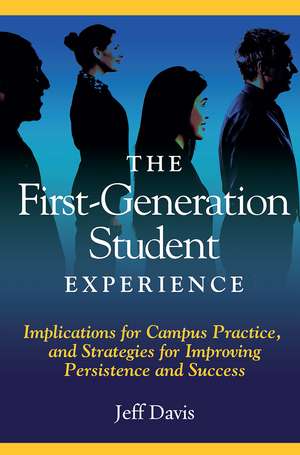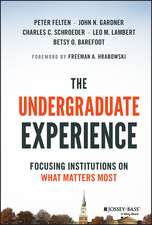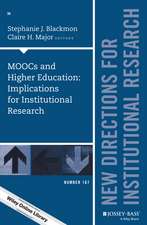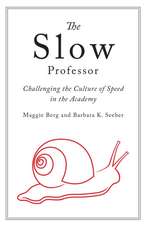The First Generation Student Experience: Implications for Campus Practice, and Strategies for Improving Persistence and Success: An ACPA Co-Publication
Autor Jeff Davisen Limba Engleză Paperback – 17 mar 2010
Din seria An ACPA Co-Publication
- 5%
 Preț: 252.12 lei
Preț: 252.12 lei - 5%
 Preț: 233.04 lei
Preț: 233.04 lei -
 Preț: 412.31 lei
Preț: 412.31 lei -
 Preț: 178.14 lei
Preț: 178.14 lei -
 Preț: 274.83 lei
Preț: 274.83 lei - 5%
 Preț: 262.27 lei
Preț: 262.27 lei -
 Preț: 276.63 lei
Preț: 276.63 lei -
 Preț: 305.67 lei
Preț: 305.67 lei - 5%
 Preț: 1154.29 lei
Preț: 1154.29 lei - 5%
 Preț: 264.25 lei
Preț: 264.25 lei - 18%
 Preț: 1005.17 lei
Preț: 1005.17 lei - 18%
 Preț: 998.40 lei
Preț: 998.40 lei - 5%
 Preț: 301.72 lei
Preț: 301.72 lei - 18%
 Preț: 998.21 lei
Preț: 998.21 lei - 5%
 Preț: 332.43 lei
Preț: 332.43 lei - 15%
 Preț: 206.86 lei
Preț: 206.86 lei
Preț: 245.69 lei
Preț vechi: 258.63 lei
-5% Nou
Puncte Express: 369
Preț estimativ în valută:
47.02€ • 49.15$ • 39.73£
47.02€ • 49.15$ • 39.73£
Carte tipărită la comandă
Livrare economică 06-20 martie
Preluare comenzi: 021 569.72.76
Specificații
ISBN-13: 9781579223700
ISBN-10: 1579223702
Pagini: 214
Dimensiuni: 152 x 229 x 15 mm
Greutate: 0.31 kg
Ediția:New.
Editura: Taylor & Francis
Colecția Routledge
Seria An ACPA Co-Publication
Locul publicării:Oxford, United Kingdom
ISBN-10: 1579223702
Pagini: 214
Dimensiuni: 152 x 229 x 15 mm
Greutate: 0.31 kg
Ediția:New.
Editura: Taylor & Francis
Colecția Routledge
Seria An ACPA Co-Publication
Locul publicării:Oxford, United Kingdom
Public țintă
PostgraduateCuprins
Introduction 1. How many First-Generation College Students Are There? 2. The Observable Behaviors of First-Generation College Students 3. The Internal Psychology of First-Generation College Students 4. In Their Own Words 5. Narrative Analysis 6. Recommendations Conclusion References About the Author Index
Notă biografică
Jeff Davis is an English professor, academic counselor, and administrator at Sonoma State University in California. He became interested in the plight of first-generation college students when he was exposed to the work being done with nontraditional students on the Sonoma State campus through federal TRIO grant projects, which led to his becoming Director of a TRIO Student Support Service project and a TRIO McNair Scholars project. He is currently involved in designing an institute for the study of the first-generation student experience to be housed at Sonoma State.
Recenzii
"This is a useful text for teachers in undergraduate programs of religion and theology, especially those teaching in undergraduate programs at religion-based institutions that attract larger numbers of first-generation and other non-traditional students. The observations in this book can help teachers begin to think about how this student population is defined and what services are necessary to address student needs."
Joy Bostic, Case Western Reserve University
Teaching Theology & Religion
"Davis should be applauded for his effort to shed light on first-generation students and their experiences in particular. He tasks the field of higher education with better accounting for first-generation students and for working to identify a universal definition for first-generation students as coming from families where neither parent holds a college degree. The book is accessible to scholars and student affairs administrators and, most importantly, to the very population I suspect Davis hopes to reach with this book, first-generation students who are navigating the often rough and chilly waters on their way to being the first in their families to earn a college degree."
Journal of College Student Development
"The information in this book can be valuable to advisors and administrators who work in colleges with a large number of first-generation students. Even advisors who may not work with large numbers of first-generation students will find the information interesting and transferrable to other student groups. The process Davis described can be utilized with other student groups."
NACADA Journal (National Academic Advising Association)
"Author Jeff Davis offers keen insight into the first-generation student experience with this readable, informative, and persuasive volume. Smartly pairing academic analysis with student narratives, Davis describes and demonstrates the key barriers to student success for this growing contingent of American students. By decoupling parental education from family income, Davis underscores how many first-generation students' struggles originate in a lack of experience with college culture or college-going identity. He presents a range of promising recommendations to support the increasing number of first-generation students who are now enrolling in American higher education."
Diversity and Democracy
“Jeff Davis does an excellent job of defining, deciphering, and discussing the experiences, issues, and successes of first generation college students on both the individual and institutional levels. However, the real richness of this resource comes from the voices of students themselves. Hearing their stories through personal narratives illustrates both the diversity of background yet the commonality of challenge that first generation college students experience in their transitions into and through higher education. The content of this book has the power to inspire higher educators to examine their commitment to the success of first generation college students, provides concrete recommendations for practice in service to this growing population of undergraduates, and, thus, brings us several steps closer to an answer.”
Jennifer R. Keup, Director
National Resource Center for The First-Year Experience and Students in Transition
Joy Bostic, Case Western Reserve University
Teaching Theology & Religion
"Davis should be applauded for his effort to shed light on first-generation students and their experiences in particular. He tasks the field of higher education with better accounting for first-generation students and for working to identify a universal definition for first-generation students as coming from families where neither parent holds a college degree. The book is accessible to scholars and student affairs administrators and, most importantly, to the very population I suspect Davis hopes to reach with this book, first-generation students who are navigating the often rough and chilly waters on their way to being the first in their families to earn a college degree."
Journal of College Student Development
"The information in this book can be valuable to advisors and administrators who work in colleges with a large number of first-generation students. Even advisors who may not work with large numbers of first-generation students will find the information interesting and transferrable to other student groups. The process Davis described can be utilized with other student groups."
NACADA Journal (National Academic Advising Association)
"Author Jeff Davis offers keen insight into the first-generation student experience with this readable, informative, and persuasive volume. Smartly pairing academic analysis with student narratives, Davis describes and demonstrates the key barriers to student success for this growing contingent of American students. By decoupling parental education from family income, Davis underscores how many first-generation students' struggles originate in a lack of experience with college culture or college-going identity. He presents a range of promising recommendations to support the increasing number of first-generation students who are now enrolling in American higher education."
Diversity and Democracy
“Jeff Davis does an excellent job of defining, deciphering, and discussing the experiences, issues, and successes of first generation college students on both the individual and institutional levels. However, the real richness of this resource comes from the voices of students themselves. Hearing their stories through personal narratives illustrates both the diversity of background yet the commonality of challenge that first generation college students experience in their transitions into and through higher education. The content of this book has the power to inspire higher educators to examine their commitment to the success of first generation college students, provides concrete recommendations for practice in service to this growing population of undergraduates, and, thus, brings us several steps closer to an answer.”
Jennifer R. Keup, Director
National Resource Center for The First-Year Experience and Students in Transition
Descriere
This book provides high-level administrators with a plan of action for deans to create the awareness necessary for meaningful long-term change, sets out a campus acclimation process, and provides guidelines for the necessary support structures.








